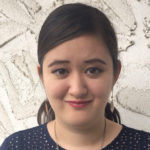Dr. Judy Larsen, who teaches upgrading math and math for teachers, was honored with the 2022 Teaching Excellence Award (TEA), recognized for her impactful teaching approaches in the classroom. The TEA winner receives $2,500.00 and a certificate. Larsen, who is currently on maternity leave and will return in the fall of 2022, shared her thoughts on teaching, the nomination process for the TEA, and how grateful she is for being bestowed with such an award.
“Having the opportunity to see these pieces of evidence come together was a privilege, and I am thankful for being granted this opportunity. I hope that others who deserve this recognition will be nominated so that they can also experience this process,” said Larsen.
She said that the journey for her after her nomination was “rigorous,” as a complete and thorough nomination package was put together that showcased her qualifications for this award. These included “letters of support from students and colleagues, student evaluations, and samples of course activities and assessments.”
Larsen found this procedure both “inspiring and affirming, since I was able to reflect on my work through the eyes of students and colleagues who wrote letters of support, and to look back on my work with as a whole the samples of course activities I provided.”
When asked about her teaching process, Larsen said that she believes it is important to immediately recognize and celebrate the skills of her students, and points out that these skills do not need to be math-related. She asserts that drawing from life experiences is equally important when students are working together on math assignments, because they lead to what she calls “novel ideas” that she cannot “pre-teach” that can help with the learning experience.
“My role is to facilitate and orchestrate generative collaborations and moments of ‘meaning making,’ as opposed to transmitting ‘meaning made.’”
She goes on to say that this teaching approach is useful in giving opportunities to students to convey “tentative knowledge” in a supportive and “safe place” that allows them to test their theories and ideas. She added that this can help decrease anxiety from students in case they are incorrect. Larsen said that many times students are afraid to make an error, but she affirms that it is all part of the process and it should be “embraced,” not feared.
When asked about the “Building Thinking Classroom” framework, Larsen said that it was originally created by her “graduate supervisor, Dr. Peter Liljedahl,” and they have worked together over the years. She said, “Our collaborations have deeply influenced my thinking about learning.”
“To explain it simply, the ‘Building Thinking Classrooms’ framework offers specific strategies for teachers to use to develop a classroom community where thinking is at the forefront. Part of the framework involves setting up the classroom in a way that challenges institutional norms,” said Larsen.
She explained that instead of having rows of desks, students will sit in various “clusters,” and the instructor can teach where they feel most comfortable in the classroom. Students are taught to learn together, and “build” on what their peers are doing on the white boards. Larsen said, “The framework is aimed to use class time in a way that harnesses the opportunities of everyone in the room together, so that learning can be the focus rather than note taking.”
For the future, Larsen wants to resume working on research projects that focus on the “student experiences of building thinking classroom attempts in an online environment, analyzing ideas and how they emerge within social media professional development contexts, and another one I plan to begin will involve student beliefs about mathematics.” She added, “These all have a benefit to students and the university since they involve understanding more about how we can better support learning.”
When asked what she felt was the most important aspect about teaching, Larsen reiterated what she said earlier about appreciating the students and their “capabilities.” She went on to say that “what I hope students take away from their university education is that there are many ways to view any sort of problem or experience, and that unique views are important and valuable towards any situation. However, knowing also that one’s unique view is not the only one is equally as important.”

Rachel is working towards a BA with a concentration in English and Theatre. She has been employed at The Cascade since Fall 2021 as a Staff Writer and a Jr. News Editor. Currently, she is the sectional News Editor and enjoys meeting and interviewing people as well as taking long walks in nature. Rachel also likes to stay up to date on the latest trends and informs students through her fashion column entitled Campus Fashion.


